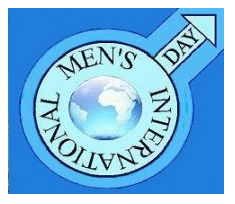 In the run up to International Men’s Day 2012 (Monday 19th November) we’re asking supporters of the day to focus on five key challenges that will help us improve the health and wellbeing of men and boys all over the world.
In the run up to International Men’s Day 2012 (Monday 19th November) we’re asking supporters of the day to focus on five key challenges that will help us improve the health and wellbeing of men and boys all over the world.
Some of the universal health issues that men and boys in all countries around the globe face include lower life expectancy, difficulty accessing mental health services, educational disadvantages, lack of male role models and tolerance of violence against men and boys.
To help us focus our collective minds upon helping men and boys live longer, happier, healthier lives, the five key challenges that the International Men’s Day team is inviting men and women all over the world to address are:
1. IMPROVING MEN’S LIFE EXPECTANCY:
From the moment a boy is born he can expect to live a shorter life than his female counterparts in all but four countries on the planet. There is also a huge gap in life expectancy between rich and poor countries with men in Mozambique reaching an average age of 38 while in Iceland, Israel and Switzerland men live twice as long until the age of 80. There are also huge gaps in life expectancy within countries, with men born in the poorest parts of the United Kingdom, for example, dying 10 years sooner than their fellow countrymen in the wealthiest parts of the capital city. Boys are not genetically programmed to die young so our first challenge this International Men’s Day is to ask countries taking part to consider how we can help all men and boys live longer, happier, healthier lives – no matter how poor they are and no matter what country they are born in.
2. HELPING MEN GET HELP:
Every year poor mental health drives over three quarters of a million people to commit suicide – and around two thirds of them are males. Men and boys all over the world can find it more difficult to access help for mental and emotional health problems and most prison populations include a significant number of men with mental health issues. This International Men’s Day we are asking participating countries to consider how we can help more men and boys get the help and support they need and to take action on behalf of the hundreds of thousands of men who will take their own lives this year.
3. IMPROVING BOYS’ EDUCATION:
Poor education is linked to poor health outcomes later in life so improving boys’ education will also help men and boys live longer, happier healthier lives. This International Men’s Day we are asking people to explore why boys in richer countries are underperforming girls and also less likely to be in education, and why tens of millions of boys in poorer countries are still not completing a primary education? How can we address truancy and poor literacy rates which leave boys prone to adult unemployment, substance abuse, obesity, depression and poverty? What action can we take to focus on boys’ education in a way that closes the gap between girls and boys, addresses the gaps between rich boys and poor boys, and helps us to improve the long-term health and wellbeing of all men and boys.
4. TACKLING TOLERANCE OF VIOLENCE AGAINST MEN AND BOYS:
Violence has a major impact on men’s health all over the world. Every year over half a million people die from violence and 83% of them are men and boys. The same proportion of the global burden of disease (ill-health, disability or early death) from violence is borne by boys and men. Yet while there are now a number of deserved global campaigns to tackle violence against women and girls, there are no such campaigns to help men and boys. Why are we so tolerant of violence and abuse against boys and men and why do we still tolerate a world where we send boys and young men to fight wars on behalf of the adults in power? This International Men’s Day we are asking for actions we can take to help men and boys live in a less violent world and challenge our collective global tolerance of violence against men and boys.
5: PROMOTING FATHERS AND MALE ROLE MODELS
Fathers and male role models play a vital role in helping boys make a healthy, happy and positive transition from boyhood to manhood. How can we give boys a right to family life that gives them an equal opportunity to know and experience both their father and mother and ensure that their role as a future father is equal to girls’ role as future mothers? Giving boys a range of positive life choices in terms of family, work and leisure can help us reduce the number of boys whose choices are limited and end up poor, illiterate, unemployed, homeless, imprisoned and isolated. This International Men’s Day we are asking what actions we can take to give all boys access to a variety of male role models and ensure their country’s laws and practices give them an equal right to fatherhood, with all the support they need to be the best fathers they can be.
Addressing each of these challenges will help us to help men and boys all over the world to live longer, happier, healthier lives, which is why we are inviting supporters of International Men’s Day to join us in taking on one of more of these five key challenges in 2012.



